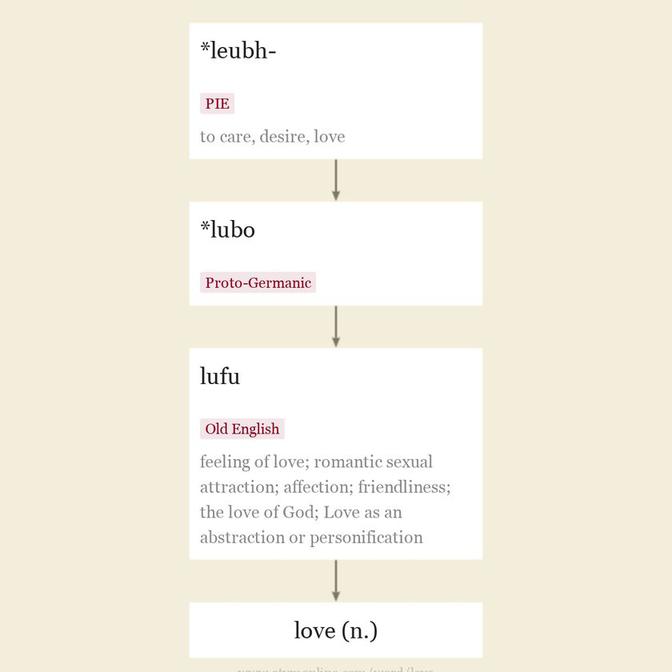Old English lufu "feeling of love; romantic sexual attraction; affection; friendliness; the love of God; Love as an abstraction or personification," from Proto-Germanic *lubo (source also of Old High German liubi "joy," German Liebe "love;" Old Norse, Old Frisian, Dutch lof; German Lob "praise;" Old Saxon liof, Old Frisian liaf, Dutch lief, Old High German liob, German lieb, Gothic liufs "dear, beloved"). The Germanic words are from PIE root *leubh- "to care, desire, love."
The weakened sense "liking, fondness" was in Old English. Meaning "a beloved person" is from early 13c. The sense "no score" (in tennis, etc.) is 1742, from the notion of playing for love (1670s), that is, for no stakes. Phrase for love or money "for anything" is attested from 1580s. The phrase no love lost (between two people) is ambiguous and was used 17c. in reference to two who love each other well (c. 1640) as well as two who have no liking for each other (1620s, the usual modern sense).
To fall in love is attested from early 15c.; to be in love with (someone) is from c. 1500. To make love is from 1570s in the sense "pay amorous attention to;" as a euphemism for "have sex," it is attested from c. 1950. Love affair "a particular experience of love" is from 1590s. Love life "one's collective amorous activities" is from 1919, originally a term in psychological jargon. Love beads is from 1968. Love bug, imaginary insect, is from 1883. Love-handles "the fat on one's sides" is by 1967.
"Even now," she thought, "almost no one remembers Esteban and Pepita but myself. Camilla alone remembers her Uncle Pio and her son; this woman, her mother. But soon we shall die and all memory of those five will have left the earth, and we ourselves shall be loved for a while and forgotten. But the love will have been enough; all those impulses of love return the love that made them. Even memory is not necessary for love. There is a land of the living and a land of the dead and the bridge is love, the only survival, the only meaning." [Thornton Wilder, "Bridge of San Luis Rey," 1927]
Old English lufian "to feel love for, cherish, show love to; delight in, approve," from Proto-Germanic *lubojanan (source also of Old High German lubon, German lieben), a verb from the root of love (n.). Weakened sense of "like" attested by c. 1200. Intransitive sense "be in love, have a passionate attachment" is from mid-13c. To love (someone) up "make out with" is from 1921. To love and leave is from 1885.
This truth came borne with bier and pall,
I felt it, when I sorrow'd most,
'Tis better to have loved and lost,
Than never to have loved at all —
[Tennyson, "In Memoriam"]
Old English luflic "affectionate, loving; loveable;" see love (n.) + -ly (1). Sense of "lovable on account of beauty, attractive" is from c. 1300; in modern use "applied indiscriminately to all pleasing material objects, from a piece of plum-cake to a Gothic cathedral" [George P. Marsh, "The Origin and History of the English Language," 1862]. As an expression of delight, 1610s.
"affectionate," early 14c. (Old English had lufende "affectionate"), verbal noun from love (v.). Loving-cup, made for several to drink from, is attested from 1808. Loving-kindness was Coverdale's word to describe God's love (Psalm lxxxix.33).
"love, friendship," also "sexual love," late 14c., verbal noun from love (v.).
c. 1300, past-participle adjective from love (v.). Loved ones "friends and relations" (especially those deceased) is by 1793, earlier often beloved ones.
old name for "tomato," 1570s, translating French pomme d'amour, corresponding to German Liebesapfel, etc., but the alleged aphrodisiac qualities that supposedly inspired the name seem far-fetched. The phrase also has been explained as a mangled transliteration of the Italian name pomo d'oro (by 1560s), taken as from adorare "to adore," but probably rather from d'or "of gold" (the earliest tomatoes brought to Italy in the mid-1500s apparently were of the yellow or orange variety), or, less likely, pomo de'Mori or Spanish pome dei Moro, literally "Moorish apple."


